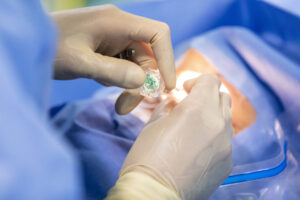Eye diseases
AMD (Age-Related Macular Degeneration)

What is AMD?
AMD (age-related macular degeneration) is a degenerative disease that affects the macula and the central portion of the retina, the part responsible for 90% of vision and where visual acuity is the clearest and most accurate.
It is the leading cause of blindness in those aged over 55 in developed countries and is present to some degree in a third of the population aged over 70. It can present in two forms:
- Dry or atrophic AMD: this is the most common form (approximately 85% of cases) and it progresses slowly and gradually over time. Deposits form (drusen) and changes occur to the pigment epithelium (layer that nourishes and maintains the retina). If it doesn’t receive nutrients, the macula degenerates and can atrophy completely in advanced stages. This type of AMD can evolve to the wet form.
- Wet or exudative AMD: to compensate for the lack of nutrients, sometimes new abnormal blood vessels develop, which can bleed, deform the retina and cause various complications. When this happens, loss of vision is rapid and aggressive, in weeks or a few months.
Symptoms
Causes and risk factors
Treatment
AMD causes no pain or discomfort aside from the central vision problems. It is a disease that can be very disabling since, although peripheral vision is conserved, the patient has increasing difficulties recognising faces, reading, writing, watching the TV, walking and using the stairs or carrying out various precision tasks.
If you notice a sudden loss of vision, distortion, deformation or alteration in the size of images or the appearance of a fixed black spot in the middle of your field of vision, you must consult your ophthalmologist immediately. You may be developing wet AMD which requires immediate treatment.



